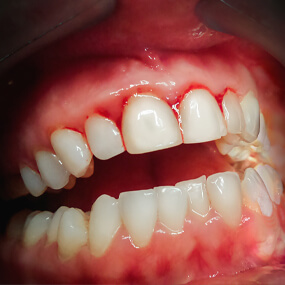How a Healthy Mouth May Help Prevent Alzheimer’s Disease

The American Dental Association (ADA) recommends that you brush, floss, rinse, and visit your dentist on a regular basis. These steps are key to eliminating the plaque that can lead to tooth decay and gum disease. But did you know that they can also help to protect your cognitive health?
The journal Science Advances recently published a study demonstrating a connection between dementia and gum disease. Porphyromonas gingivalis (P. gingivalis) is a bacterium most commonly associated with periodontitis, which is an advanced infection of the soft tissues that support your teeth. This study found P. gingivalis in the brains of people suffering from Alzheimer’s.
A private pharmaceutical company—Cortexyme—conducted the study as an early phase in developing a new drug to block this pathogen. Not only did the researchers find P. gingivalis, but they found that the infection caused by it prompted the production of a particular amino acid, amyloid beta, and the clumping together of this amino acid is one of the signature characteristics of Alzheimer’s.
Alzheimer’s may, in fact, be a type of brain infection. Memory loss may be a symptom of that infection, just as swelling and tenderness are symptoms of periodontitis. Toward that end, Cortexyme has developed COR388, which is an investigational drug, meaning that the U.S. Food and Drug Administration has approved it for clinical trials involving people. In the earliest trials, patients being treated with COR388 experienced reduced inflammation and P. gingivalis and amyloid beta levels.
Stephen Dominy, MD, is the co-founder of Cortexyme and the lead author of the paper published in Science Advances. In a press release concerning the research, Dominy mentioned that this was the first solid evidence that Alzheimer’s patients could be treated with therapies targeting P. gingivalis.
This research is not the first, however, to connect periodontitis to dementia. The journal Frontiers in Aging Neuroscience published a study in 2017 that made this connection. Those researchers had a working hypothesis that it was the ongoing inflammation of the gums that eventually led to Alzheimer’s.
It is quite exhilarating that science may be on the brink of a cure for a disease that has devastated millions of families. But it also emphasizes an important point: protecting your brain is an excellent reason to take care of your teeth and gums. The risk here is not just Alzheimer’s and other types of dementia. Researchers at New York University published a paper in the journal Alzheimer’s & Dementia that demonstrated periodontal disease as a risk factor for cognitive decline, and other research has linked tooth loss to minor memory impairment in seniors.
According to the ADA, nearly 50 percent of U.S. adults age 30 and up suffer from chronic periodontitis. Dementia may be the endgame, but this is not just something that will affect you in your advanced years. Problems with your teeth and gums may be affecting your cognitive capabilities right now.
Gingivitis is the earliest stage of gum disease. Dentists can often diagnose gingivitis before symptoms manifest. As the disease progresses without treatment, symptoms can include reddening and swelling as well as bleeding when you brush your teeth. Even at this point, gingivitis is reversible. It requires consistent oral hygiene and visits to your dentist to clean your teeth and manage the treatment.
But proactive oral hygiene and regular dental visits ensure that you never get gingivitis in the first place. On the other hand, if you do get gingivitis and let it go, it will eventually develop into periodontitis. Periodontitis, unfortunately, is not curable. You can only manage it through treatments, which is why you never want to get to that point.
The ADA recommends that you brush twice a day with a soft-bristled brush and fluoride toothpaste. Brush after breakfast and before you go to bed. Floss once every 24 hours, which is about how long it takes for plaque to form. Balance your diet with oral health in mind, and visit your dentist on a regular basis. The ADA advises an annual visit as the bare minimum. Most dental professionals advise a visit every six months, and if you have gingivitis or more serious gum disease, your dentist may recommend a more frequent schedule in order to monitor and treat that condition.
Keep Your Teeth and Gums Healthy and Your Mind Sharp
Just because your teeth and gums look and feel healthy doesn’t mean they necessarily are. A common mistake younger people make is seeing their dentists for reactive reasons rather than proactive ones. The preventative care you get today can help keep your mouth healthy and your mind sharp throughout your life. Schedule your checkup with Jeffrey D. Clark, DDS, today. You can reach Scottsdale Cosmetic Dentistry Excellence at 480 585 1853.




